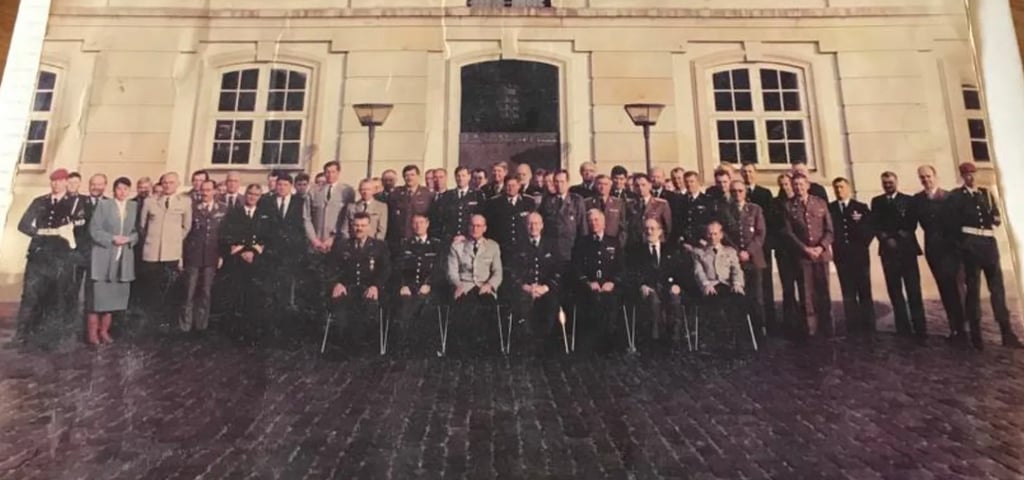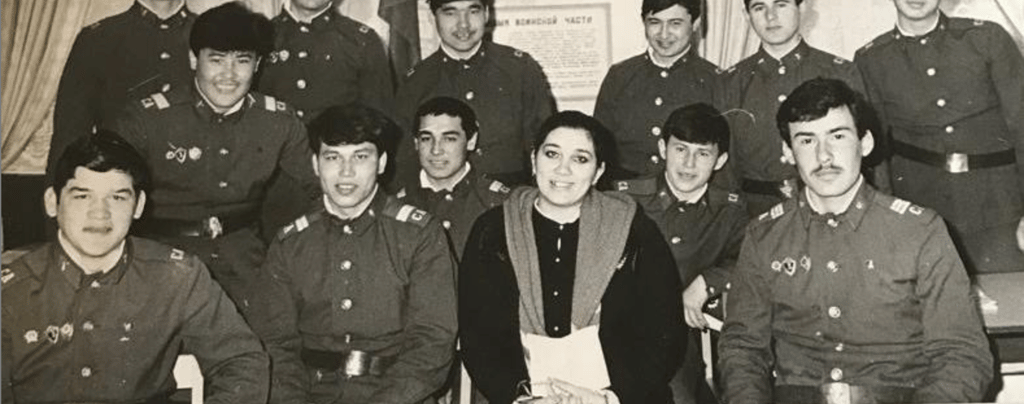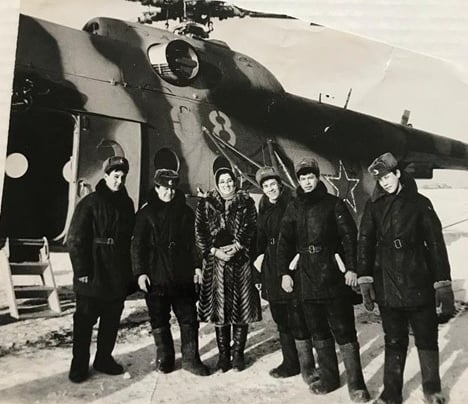Fascism Then and Now
A Writer's Journey
Aziza Hon
1/16/20265 min read
The author (4th from left in light blue) attending a NATO conference in 1997.
Recently, my sister sent me some photos from my archive. An unexpected memory surfaced.
At the end of 1990, I started working for the international publication Uzbekistan-CONTACT, published in twelve languages. As a new reporter, I became familiar with readers’ letters. I was surprised that most of the letters came from the parents of recruits. At that time, military service was mandatory for two years in the armed forces throughout the country. The parents’ letters asked for information about their young men’s military service. They were concerned about their loved ones’ silence.
In January, I approached the magazine’s Editor-in-Chief, Kahhar Fattakhovich Rashidov, with a proposal for a new article for publication. He supported my initiative. In the Turkestan Military District, I learned that many Uzbekistanians served in the Siberian Military District. I was sent, along with veteran photojournalist Valentin Kavelin, to Novosibirsk.
We had the opportunity to meet with a group of young Uzbeks. They were teenagers, many of them from distant regions. Some of these young recruits spoke no Russian. They were punished for various infractions, not because they didn’t want to obey their orders; rather they didn’t understand their orders. I had the chance to talk to the guys in our native language. Many were sad. The soldiers, from hot and sunny Uzbekistan, found themselves in bitter Siberian cold serving in construction battalions. These were “troops” with poor eyesight, congenital deafness among other illnesses. Under a standard recruitment approach, these guys wouldn’t have been eligible for military service due to their poor health conditions. It was far easier for those who’d graduated from the Russian schools; many were assigned to prestigious squadrons. When we returned to Uzbekistan, Soviet censorship prevented us from discussing these issues. Despite this, everyone on TV was talking about Perestroika and Glasnost.
Our material was eventually published, though in a manner intended only to mollify the desperate parents of dead soldiers.
“Everything is fine, your sons are healthy and happy.”
But, as we realized a decade later, they needed cannon fodder for Afghanistan.
Author (TOP center-right - - BOTTOM center left) with Uzbek soldiers in Siberia, January, 1991.
These days, the lengthy war started by Vladimir Putin pitting Russia against Ukraine, has created another bleeding patch of Earth while Putin’s Russia hemorrhages what’s left of its own humanity in the process.
In early 2000, during the regular sessions of the Oliy Majlis (the parliament of Uzbekistan), I had the opportunity to work as a translator. While there, I listened to the first President of Uzbekistan, Islam Karimov, speaking about how five hundred Uzbek soldiers “returned” home (in zinc coffins) in 1989. The parents of said soldiers were strictly forbidden to view the bodies or even bury them in religious rituals. All the caskets came from neighboring Afghanistan, a country which has suffered the consequences of endless war for more than thirty years.
***
“On May 9th, I visited Nuremberg, the historic site of the Nuremberg Trials. These trials aspired to mark a turning point in human history — a legal and moral foundation to ensure that such crimes against humanity would never happen again. One wall listed every mass atrocity committed globally since 1945. The list continues to grow today. Eighty years after WW II ended, it seems we have learned nothing…”
The above words are paraphrased from a relative’s Facebook page. He wrote them after visiting Nuremberg and learning more about something that has always worried me and probably always will. War, in all its chaotic complexity and useless barbarism, remains with us still. Its festering presence besieges humanity to this day.
I’m a daughter of a World War II veteran and I grew up with the monstrous stories of fascism, begetting untold suffering. Fascism carries many vices: sense of victimization, malice, hatred, cruelty, greed and bloodthirstiness. They're all contained in its supreme confidence of self-rightness. The perceived right to destroy nations and turn cities to ruin. A domination on its way to a self-destroying destiny of the dead: the deaths of those it leaves in its wake.
The British, having seen and experienced firsthand the unforgivable atrocities of the Nazis, stubbornly bent their line to shoot war criminals, especially the ringleaders, as a matter of honoring the forsaken victims of Hitler’s brand of national socialism. They considered it fair not to hold any investigation, forgetting trials outright.
Today, a similar brand of fascism (actual Nazis) raises its ugly head, yet somehow without the extenuating shame that has accompanied past generations.
One might think, perhaps, the British were correct, both in their estimation and in their determination. In 1945, good people believed that they could not act like the Nazis, that there would be a moral equivalence lent to such actions, and that they, in turn, would submit to history’s judgment.
The International Military Tribunal (1945-46) shocked the planet, exposing fascism’s brutal reality, and then the world hoped and prayed that THIS MUST NEVER HAPPEN AGAIN. Historically, though, memory is somewhat more fickle than they envisioned.
Eighty years ago, the Nuremberg Trials expressed the will and determination of freedom-loving people who stood firm in the moral and physical battles against fascism. That tribunal branded the Hitlerite party as a hellish hotbed of war crimes, a conspiracy to commit unthinkable acts against humanity. Crimes far too numerous and too filled with evil - things which should be obvious to any rational thinker. The Nuremberg Trials exposed the essence of German fascism. Its’ plan: to destroy entire states and attempt to make sterile any potential human diversity, such that would otherwise develop organically. It might be argued that that is one of the least pressing dangers fascism poses to the world.
Much water has flowed under a bridge with a wobbling foundation. In the rivers of our lives since those dark pages of human history, we have had new wars, fresh battles for justice - and conflicts that brought widespread chaos to civilians. War still destroys the innocent to this day. A morally courageous patch of humankind bleeds in Ukraine. Regardless, they will not lie down.
Rather than take steps to seek and promote peace, the Department of Defense is now the Department of War. I don't have current knowledge of diplomatic efforts. It does, however, seem to be a measure of how human progress in this day and age falters in a time of increasing despair for many of the Earth’s people. So maybe everyone is just looking for a molecule of hope. Here, it seems, it is aimed at protecting those we love. For our children's children's children, for humanity.
Today’s Light of Sanity: The Moody Blues "To our Children's Children's Children" released January 1, 1969







Explore
Subscribe our newsletter and begin your journey into her universe of storytelling.
Connect
Discover
aziza.hon.info@gmail.com
(513)706-8032
© 2025. All rights reserved.